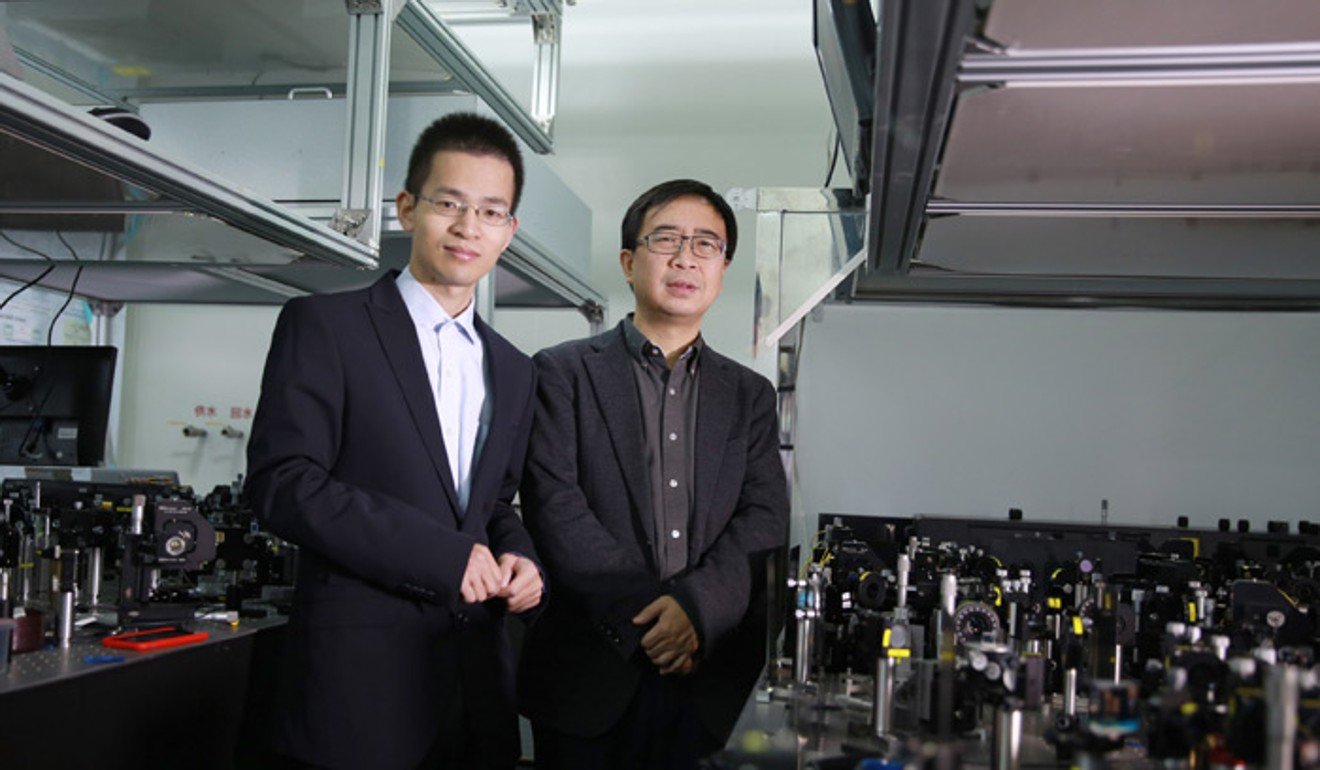- Sep 17, 2013
- 1,492
A team of scientists from eastern China has built the first form of quantum computer that they say is faster than one of the early generation of conventional computers developed in the 1940s.
The researchers at the University of Science and Technology of China at Hefei in Anhui province built the machine as part of efforts to develop and highlight the future use of quantum computers.
The devices make use of the way particles interact at a subatomic level to make calculations rather than conventional computers which use electronic gates, switches and binary code.'
The Hefei machine predicts the highly complex movement and behaviour of subatomic particles called photons, which make up light.
Normal supercomputers struggle to predict the behaviour of photons because of their huge level of unpredictability and the difficulties in modelling.
Pan Jianwei, the lead scientist on the project, told a press briefing in Shanghai on Wednesday that their device was already 10 to 11 times faster at carrying out the calculations than the first electronic digital computer, ENIAC, would have been capable of. ENIAC was developed in the 1940s.
In a few years’ time, he said, their machine would eclipse all of the world’s supercomputers in carrying out the calculations.
The Chinese team admit that their machine is of no practical use as it only carries out this one highly complex form of calculation, but it highlights the future potential of quantum computing. The team’s research was formally published in the scientific journal Nature Photonics on Tuesday.
Scientists estimate that the current faster supercomputers would struggle to estimate the
behaviour of 20 photons.

The Hefei researchers’ quantum device, called a boson sampling machine, can now carry out calculations for five photons, but at a speed 24,000 times faster than previous experiments, they say.
“Our architecture is feasible to be scaled up to a larger number of photons and with a higher rate to race against increasingly advanced classical computers,” they said in the research paper.
Professor Scott Aaronson, who is based at the University of Texas at Austin and proposed the idea of the boson sampling machine, questioned whether it was useful to compare the latest results with technology developed over 60 years ago, but he said the research had shown “exciting experimental progress”.
“It’s a step towards boson sampling with say 30 photons or some number that’s large enough that no one will have to squint or argue about whether a quantum advantage has been attained,” he said.
Araronson said one of the main purposes of making boson sampling machines was to prove that quantum devices could be shown to have an advantage in one area of complex calculations over existing types of computer.
“Doing so would answer the quantum computing sceptics and help pave the way towards universal quantum computation,” he said.
The researchers at the University of Science and Technology of China at Hefei in Anhui province built the machine as part of efforts to develop and highlight the future use of quantum computers.
The devices make use of the way particles interact at a subatomic level to make calculations rather than conventional computers which use electronic gates, switches and binary code.'
The Hefei machine predicts the highly complex movement and behaviour of subatomic particles called photons, which make up light.
Normal supercomputers struggle to predict the behaviour of photons because of their huge level of unpredictability and the difficulties in modelling.
Pan Jianwei, the lead scientist on the project, told a press briefing in Shanghai on Wednesday that their device was already 10 to 11 times faster at carrying out the calculations than the first electronic digital computer, ENIAC, would have been capable of. ENIAC was developed in the 1940s.
In a few years’ time, he said, their machine would eclipse all of the world’s supercomputers in carrying out the calculations.
The Chinese team admit that their machine is of no practical use as it only carries out this one highly complex form of calculation, but it highlights the future potential of quantum computing. The team’s research was formally published in the scientific journal Nature Photonics on Tuesday.
Scientists estimate that the current faster supercomputers would struggle to estimate the
behaviour of 20 photons.

The Hefei researchers’ quantum device, called a boson sampling machine, can now carry out calculations for five photons, but at a speed 24,000 times faster than previous experiments, they say.
“Our architecture is feasible to be scaled up to a larger number of photons and with a higher rate to race against increasingly advanced classical computers,” they said in the research paper.
Professor Scott Aaronson, who is based at the University of Texas at Austin and proposed the idea of the boson sampling machine, questioned whether it was useful to compare the latest results with technology developed over 60 years ago, but he said the research had shown “exciting experimental progress”.
“It’s a step towards boson sampling with say 30 photons or some number that’s large enough that no one will have to squint or argue about whether a quantum advantage has been attained,” he said.
Araronson said one of the main purposes of making boson sampling machines was to prove that quantum devices could be shown to have an advantage in one area of complex calculations over existing types of computer.
“Doing so would answer the quantum computing sceptics and help pave the way towards universal quantum computation,” he said.